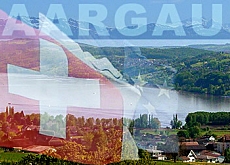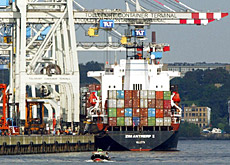Economic growth – the “bottom-up” way

Canton Aargau has become tired of waiting for the government to stimulate the flagging national economy and has launched its own ambitious action plan.
The German-speaking canton is bucking a trend in a country where – federalism notwithstanding – economic policy is traditionally made at the national level.
Aargau, the fourth largest canton in economic terms, says its goal is to increase total cantonal output by 0.5 per cent per year between now and 2010.
The 25-point programme proposes measures including reducing corporate taxes, eliminating barriers to inter-cantonal competition, and creating so-called “day schools”.
“This is an excellent initiative,” Zurich University economics professor Bruno Frey told swissinfo.
“It is just what should happen in a federalist country like ours. We shouldn’t always have to wait for the federal government to act.”
Frey says the Aargau cantonal economy is large enough for the proposed measures to make a real difference, even if it acts on its own.
Playing the media
Aymo Brunetti, who heads the federal government’s economic policy directorate, also welcomed the initiative, although he pointed out that it is not the first of its kind.
“There is a growing tendency today for cantons to take the initiative on growth promotion, rather than just wait for the federal government to act,” Brunetti said.
“While the Aargau initiative is not unique – canton Bern launched a similar one last month and Graubünden has also [done something similar] – it has had by far the most media coverage.”
Brunetti said the overall direction of the Aargau reforms seemed “absolutely correct”, and individual measures were largely in line with the federal growth promotion package launched by Economics Minister Joseph Deiss last year.
“It’s hard to say how much a single canton can achieve on its own, but the chances in Switzerland are probably better than anywhere else, because of the country’s decentralised nature and the relatively powerful position of the cantons,” he added.
Halving taxes
One of the central planks of the Aargau package is a halving of capital levies (taxes on capital or property) on companies based in the canton – from 0.25 to 0.125 per cent.
A related proposal would substantially reduce the tax burden on well-qualified workers who want to work abroad temporarily, as well as on their foreign counterparts who want to work for a limited period in Switzerland.
Such inter-cantonal tax rivalry is nothing new to the country, but the second major plank of the Aargau package definitely does break new ground – unilateral liberalisation of the domestic labour market.
The cantonal authorities say that if the long-touted revision of the federal domestic market law – which was discussed by parliament this month – does not deliver what its proponents hope, the canton will implement similar measures at a local level regardless.
In practice, this would mean ending cantonal regulations in the area of professional services that prevent workers in sectors ranging from gastronomy to handicrafts from competing successfully across cantonal borders.
Learning for growth
Aargau also plans to concentrate its resources on education and research.
The canton wants to start teaching English earlier than is currently the case – initially from the third (primary) school year and, in the longer term, from as early as the first year.
It also plans to give a major boost to working mothers by introducing something that is still very much a rarity in Switzerland – “day schools”, which offer a full-day programme, including lunches.
On the research front, the canton will support the nanotechnology sector via subsidies worth SFr5 million ($4 million) a year to Basel University to help fund collaborative projects, in particular with the Paul Scherrer Institute in the Aargau town of Villigen.
In addition, an innovation fund of SFr0.7 million per year would promote joint projects between the university and industry in the fields of energy and materials science.
At the institutional level, Aargau wants to encourage mergers between some of the canton’s 231 communes, and cut red tape.
swissinfo
The federal government has primary responsibility for Swiss economic policy, but the 26 cantons also have considerable autonomy.
Aargau has a population of about 570,000 (nationwide: over seven million).
With total annual cantonal income of some SFr27 billion, it is the fourth largest canton in economic terms (after Zurich, Bern, and Vaud).
The Swiss economy is one of the largest in terms of total income per person, but consistently comes nearly last in terms of annual growth.
The Aargau authorities want to act independently to boost the growth rate of the cantonal economy over the next five years.
Their programme includes moves to cut taxes and increase domestic market competition.

In compliance with the JTI standards
More: SWI swissinfo.ch certified by the Journalism Trust Initiative


You can find an overview of ongoing debates with our journalists here . Please join us!
If you want to start a conversation about a topic raised in this article or want to report factual errors, email us at english@swissinfo.ch.